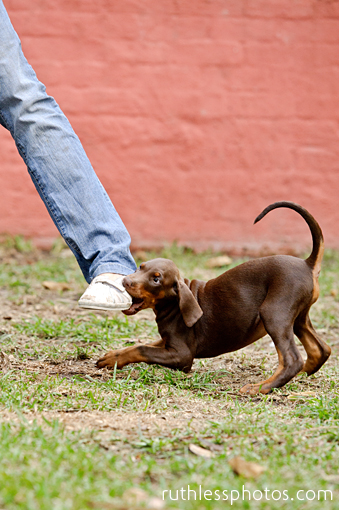The Importance of Bite Inhibition
This post is part of the series in response to Dunbar’s 2012 Australian seminars. See index.
Imagine you are at the dentist and he slips with his little scratchy-hook tool, and stabs your gum a little bit. You respond by biting down on the dentist’s finger and punching him in the face.
Or you’re asleep in your bed and you partner wakes you as she hops in. This terrifies you, so you grab your gun from under the mattress, and shoot her.

Puppies need to be guided to learn to not use the full force of their bite as an adult dog. Photo © Ruthless Photos.
Ian Dunbar used similar human-aggressive examples in his seminar to make a point: Dog-human aggression is never okay. Just like humans don’t (shouldn’t) hurt people that accidentally hurt them, and don’t hurt people that scare them, dogs shouldn’t hurt people in response to pain or fear.
There are simply no excuses for a dog to be human aggressive – it is never appropriate and never acceptable, regardless of the context.
First, appropriate socialisation should aim to build a confident puppy that is never fearful enough to bite as an adult dog. Second, a puppy should be taught how to inhibit (i.e. make less forceful) their bite so that, if for some reason they are motivated to bite in their life, the bite is less severe.
Dunbar didn’t go into much detail about teaching bite inhibition at the seminar, but basically the process involves teaching the puppy to bite less forcefully and then teaching the puppy to bite less frequently (and eventually learn that they are not allowed to put their teeth on people). Alongside this, you add a cue that means ‘let go’. (It seems that the Dunbar seminar Crystal, at Reactive Champion, attended did talk about teaching bite inhibition in more detail.)
Furthermore, puppies that attend the Dunbar-style puppy classes, with offleash play, mean that they learn how to appropriately control their bite when interacting with other dogs.
The plan is that, after teaching bite inhibition to a puppy, the adult dog will be more likely to bite in an inhibited way. That is, the depth and seriousness of the bite will be less severe. A puppy that is well socialised, but does not have bite inhibition, makes for a dangerous dog.
